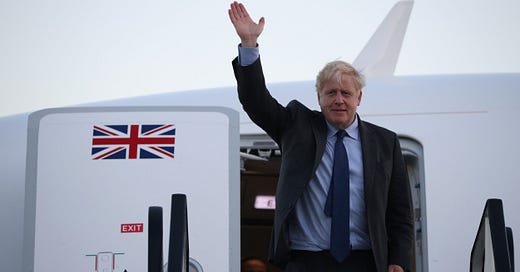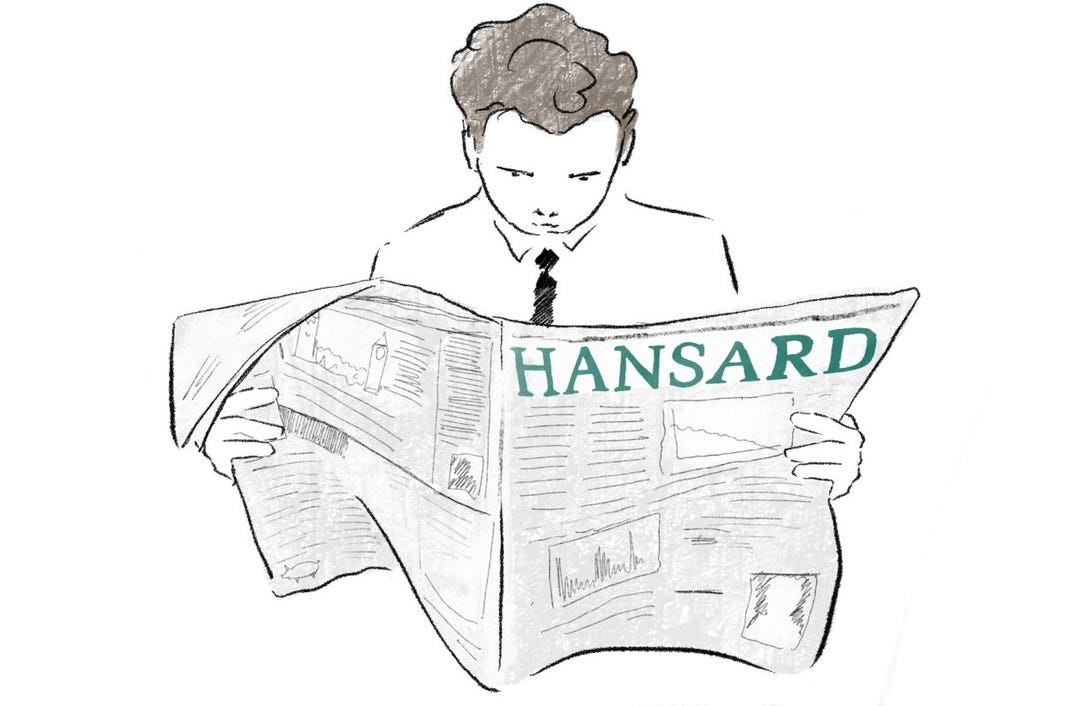Xi to visit Hong Kong, Commonwealth and realpolitik, supply chains, understanding the ISU
A Beijing to Britain briefing
Hello,
Three critical geopolitical events take place in the next five days. First, the 48th G7 Summit meets today. US officials have begun briefing that the group - joined by Argentina, India, Indonesia, Senegal and South Africa in select meetings - will be raising China's "coercive economic practices." There’s also talk of another infrastructure initiative being launched to counter China’s own Belt and Road Initiative. From here, leaders go straight to a consequential NATO gathering where the group will adopt a new Strategic Concept, its first in 12 years. We hear Chinese diplomats in capitals throughout Europe have been lobbying hard in an effort to stop Beijing being paired alongside Moscow as a strategic risk. The word on the street is they have failed in this mission, and that China will be explicitly mentioned for the first time. While both meetings will produce a number of catchy headlines, it will be discussion around the less exciting issues - tackling global recession for one, or finding alternative sources for polysilicon - that demand proper scrutiny. Finally, to finish the week and with the potential to cause serious issues is the news that President Xi Jinping will be visiting Hong Kong to mark the 25th anniversary of the Handover.
Back in Westminster, the Prime Minister was in Rwanda attempting to woo Commonwealth leaders with the Foreign Secretary in tow when his party suffered one of the worst by-election defeats on record. Away from the country for a further week, Johnson is plagued by discontent among his colleagues. In an effort to reassert some sort of control (threats of an early election fall on deaf ears), press close to Number 10 have begun circulating rumours that two Cabinet Secretaries are facing reshuffle: Business Secretary Kwasi Kwarteng, and International Trade Secretary Anne-Marie Trevelyan. Although likely an effort to instil fear in the ranks, if true, this would see the Prime Minister lose two of the most experienced officials with regards to implementing post Golden Era policies towards China.
In the City, Nat Rothschild has declared "the era of Chinese low cost manufacturing is over.” The industrialist’s comments come as his firm, cable-maker Volex, buys up competitors in the US, Mexico and India in order to sidestep Chinese-linked supply chains woes. Elsewhere, China-sceptic MPs are particularly displeased with the news around TikTok and data potentially accessed from China: one legislator who’s working on this issue gives us exclusive comment as to why. Finally, Bridgewater Associates - founded by the American billionaire investor Ray Dalio - has shorted the shares of 28 European companies, according to Bloomberg data. The world’s biggest hedge fund boosted its bet on Chinese companies in the fourth quarter of last year.
Welcome to ‘Beijing to Britain’ - a weekly overview of the ebbs and flows of the discussion in Westminster and the City around the UK’s relationship with China, and how it impacts politics, the private sector and society.
A quick look at how China is being discussed in Parliament
17 mentions of China/Chinese, no mention of Xi Jinping, 9 mentions of Hong Kong, no mentions of CCP, 1 mention of Taiwan, no mention of Tibet, 1 mention of Xinjiang
589 out of 650 MPs (90.6%) have a Twitter account.
176 MPs’ tweets containing the term ‘China/Chinese’, 1 on ‘Hong Kong’, 1 on ‘Tibet’, 0 on ‘Taiwan’
Order! Order!
Some of the more eye-catching questions and tweets from Westminster dwellers this week
Margaret Ferrier (Independent) asked “Russia has reportedly become China’s biggest oil supplier, following sanctions in the face of the conflict in Ukraine. Can the Minister set out what level of risk is posed by strengthening ties and co-dependency between China and Russia in the immediate and longer term?”
Henry Smith (Conservative, IPAC) tweeted “With a UK Parliament Foreign Affairs Committee delegation, earlier in Washington I met with the US State and Justice departments, as well as members of Congress about British and American actions tackling Russian and Chinese illicit finance and nefarious, anti-democratic attacks.”
Alan Brown (SNP Shadow SNP Spokesperson (Energy and Climate Change)) asked “the Secretary of State for Business, Energy and Industrial Strategy, what level of share ownership does China General Nuclear have within NNB Holding Company Limited, for the construction of Sizewell C Power Station.”
Iain Duncan Smith (Conservative, IPAC co-chair) tweeted “I’m pleased that having raised concerns about the nomination of HikVision for a @thebsia security award, the nomination has been withdrawn. Correct decision. We should be banning this company, not honouring them. #Uyghurs @ipacglobal @lukedepulford https://t.co/pj5eHblJNM”
Politics
Global Britain
Unpacking the latest foreign policy movements
Strap in, because this was a busy week for Global Britain. Despite the chaos at home, six thousand miles away in Rwanda, Prime Minister Boris Johnson was busy presenting a vision of a united Commonwealth bloc tied together through trade and values, while his Foreign Secretary Liz Truss urged countries to work together to thwart China. Let’s unpack the details.
In Kigali, a number of leaders converged for the Commonwealth Heads of Government Meeting (CHOGM). Here the UK announced a raft of measures and ideas aimed at increasing cohesion and collaboration between the Commonwealth countries. These included (deep breath)…a £27m partnership with the UK’s leading overseas volunteering charity, VSO...the establishment of a joint India-UK Commonwealth Diplomatic Academy programme (in the words of Truss - “In an increasingly geopolitical world, we must champion the Commonwealth values of democracy and sovereignty. The UK and India are helping to build a modern Commonwealth fit for the 21st century and delivering tangible benefits for its members”)…£217 million for three major education projects…£2.7 million to support LGBT issues and charities…a £15 million package to support Commonwealth countries to defend themselves from cyber-attacks…a new landmark Developing Countries Trading Scheme as well as new Platinum Partnership trade alliances and financial Centres of Expertise…and British International Investment(BII), the UK’s development finance institution, will invest significantly in hydropower across Africa and upgrade Uganda’s power stations to boost renewable energy capacity.
It’s worth skimming Johnson’s Twitter account to see what key messages his team wanted to hit. Themes: family, shared values, friendship. “With our shared values, history and language – the Commonwealth is a unique and vital association.”…”By striking free trade agreements and liberalising tariffs, we are powering growth & prosperity, creating jobs and easing the pressures we all face on the cost of living – benefitting all our people.” and “The Commonwealth, a family of 54 countries encompassing a third of humanity is united by an invisible thread of shared values, history and friendship.”
Foreign Secretary Liz Truss was set to deliver her own speech (as of this Briefing going to press, not yet made public) outlining concerns around “authoritarian” influence throughout the Commonwealth. Notably absent from her outlook is an economic base on which to put into motion these ideas, or the admission that many of these countries are keen not to be forced to ‘pick sides’. Skimming her tweets, we see the themes of democracy, resilience, and sovereignty expressed repeatedly: “As a group of democratic nations, the Commonwealth has a vital role to play in defending freedom and self-determination, and acting as a counterweight to malign actors.”…”Good to catch up with Commonwealth friends including India, Canada, Australia, Botswana, Bangladesh, Cyprus, Kenya, Jamaica, Singapore and Barbados. We are a network of nations who believe in sovereignty and democracy in the face of growing threats” and ”we [discussed how we] build a stronger, more resilient Commonwealth united behind our shared belief in sovereignty and self-determination”
Not present at CHOGM? New Zealand’s Jacinda Arden and Australia’s Anthony Albanese, who both prioritised the upcoming NATO meeting over the gathering, allowing their foreign minister and deputy to attend in their place. 16 other leaders were either not present or sent their deputies. South African President Cyril Ramaphosa chose to attend the BRICS Leaders’ Summit instead, hosted by President Xi Jinping in Beijing. So did India’s Narendra Modi, despite his country making up for some 60% of the population of the Commonwealth. India’s neutrality on the Russian invasion of Ukraine is still a sore sticking point for many Western policymakers - especially since it seems to have worked very well for New Delhi, which finds itself invited to major events on both sides of the split. President Xi warned those gathered that “the tragedies of the past tell us that hegemony, group politics and bloc confrontation bring no peace or security; they only lead to wars and conflicts."






